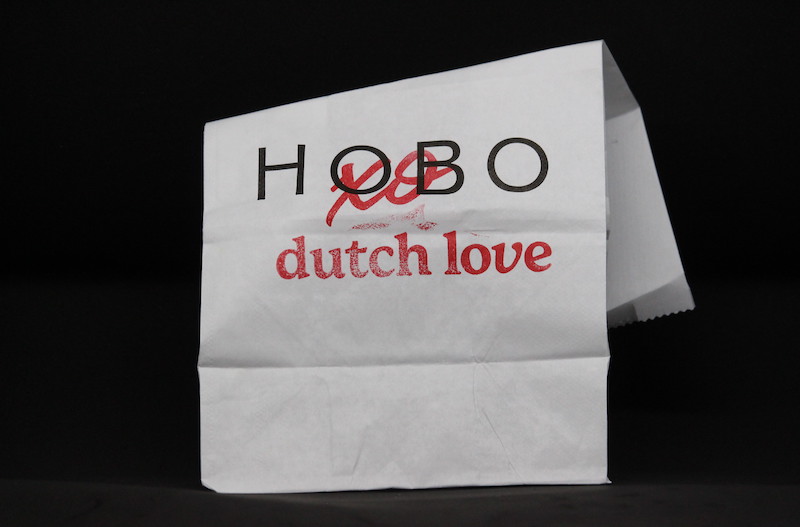Features
Time to end the online monopoly: Dutch Love VP
Published on January 15, 2021 by David Wylie
 Photo: David Wylie/the oz.
Photo: David Wylie/the oz. We talked with Harrison Stoker, vice president of the Vancouver-based hospitality company, Donnelly Group—Dutch Love’s parent company.
In Part 1 of the interview, Stoker talked about what the company has learned from its experience in the hospitality industry and why they have been so successful in securing licences.
In Part 2, Stoker discusses his preferred strategy to combat the illicit market, the BC Cannabis Stores’ online monopoly, how the rebrand from Hobo to Dutch Love has gone, and the impact COVID-19 has had on the company.
the oz. – Unlicensed cannabis stores are said to be flourishing throughout BC. How should we go about combatting the illicit market?
Stoker – Wishful thinking is certainly not enough. We are proactive in conversations with provincial and municipal policy makers and regulators. That perhaps is where some of our relationships are supporting and enabling us to get a little closer to the top on that one. We have regular meetings with the provincial government; and we actually are continually writing game plans and standard operating procedures and giving them to the province to illustrate potential framework for modern retailer features—things like delivery, shipping, online sales. It’s 2021 after all, but in cannabis retail it feels like 1992, which is bizarre. We don’t think that the province and the municipalities are going to be capable of combating it alone. We think they need to lean into the collective cannabis retail network and enable us to have modern features. We think the best way to combat it is to put ourselves into more of an even playing field with the illicit market. Give customers more choice to access regulated products. Right now those prohibitions are really putting those illicit businesses on a pedestal and making them more available to the average customer.
the oz. – Provincial BC Cannabis Stores do sell online and ship through Canada Post. Is that something private retailers should also be able to do?
Stoker – I believe that wholeheartedly. I don’t believe there’s cause for any monopoly on online sales. I don’t think that a single entity can reach the entire population. Online retail features are even more relevant today than they were a year ago as we wade our way through this pandemic and really lean into technology more and more, and less physical engagement. It’s wild to think that the province hasn’t reacted in kind to this pandemic and said let’s be more safe and more responsible in the way that customers transact and remove elements of physical engagement. Therefore, you should probably by shipping your product instead of having people come into your stores and potentially putting customers and staff in danger. Even that hasn’t turned the tides in the opinion of the provincial government. They’re still being stubborn, if you will, and holding on to their monopoly.
the oz. – What effect has COVID had on Dutch Love?
Stoker – That’s an interesting question because we have basically doubled the size of the company through COVID. As it relates to our growth strategy, we remain committed to it, albeit, we were presented with some incredible challenges. These stores are being born into somewhat of an upside-down world. I don’t think that the customer experience is at the level that we originally designed it to be. I don’t think the data as it relates to sales and transactions and all the other wonderful binary that we collect and analyze, it don’t think it is really necessarily telling the truth about the future of cannabis retail because we’re operating under some really unique conditions. We’re probably pretty bullish on what happens to cannabis retail in British Columbia and other provinces post-pandemic when a vaccinating is widely distributed and people start to return to some sense of normalcy, especially with tourism. It’s really unfortunate timing as Canada moves into this legal framework — first G7 country to do so and as the cannabis market just began to mature and become genuinely interesting to international markets, all of a sudden nobody could come visit it and experience it. We’re really excited about the idea of cannabis tourism being part of the Canadian tourism industry. We’re really excited to showcase the legal cannabis framework to the world when we can.

the oz. – How has the rebranding gone from Hobo to Dutch Love?
Stoker – It was a lot of work, but really positive. Call it, to a degree, a by-product of some real cultural and socio-economic shifts. With the pandemic, we felt like we needed to change that name, the timing was right to do so. Our customer base, although the obviously believed in the vision and were sad to see it go, but excited at its replacement.
the oz. – You recently opened a store in Lake Country, pop. 15,000, is there room there for two stores?
Stoker – In British Columbia, specifically, we don’t really look to our regulated retail peers as competitors yet. It’s the illicit market that is our collective competitor. The answer to that question really falls to how quickly British Columbia, culturally and from a policy perspective, can truly translate the illicit or legacy market into the regulated market. Right now, it’s moving at a snail’s pace. Today, one might argue that there isn’t enough business, but we need to work together to translate the illicit market into the regulated market. There certainly is enough business in the case that people are accessing cannabis through the regulated market—absolutely there is enough business.
the oz. – Can you tell us about your Good Neighbour Program?
Stoker – One really big mistake we made when we were bringing the cannabis retail brand to market was not very concretely including in the brand narrative our social responsibility program that has been around The Donnelly Group since inception, so over 20 years, The Donnelly Fund. We saw an opportunity in the rebrand of Dutch Love to more formally bring that into the equation, and we did it through the lens of the Good Neighbour Program. We feel it’s a good way to be neighbourly when we come into a new community.
Leave a comment on our Facebook page.
© Copyright 2021 Okanagan Z. | About the oz.
Report a Typo or Inaccuracy
We strive to avoid typos and inaccuracies. However, on occasion we make mistakes. We value your contributions and help in correcting them.